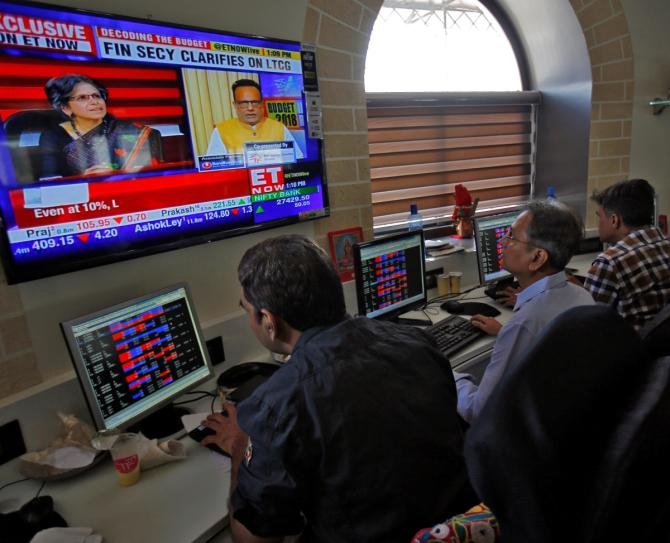'It really doesn't matter that investors getting allotments sell their IPO stock holdings on listing day because a new set of investors are entering.'
'This explains the continued rise in stock prices even after the first day of listing.'

"The 'grey' market premiums also play a role in this -- higher the premium, more the excitement of retail investors for IPOs," Mihir Vora, senior director and chief investment officer, Max Life Insurance, tells Puneet Wadhwa.
Have the markets fully discounted the possibility of a sooner-than-expected taper by the US Fed?
Markets have probably discounted a gradual tapering by the US Fed.
Recently, small-caps and commodities did correct more than large-caps.
However, keeping the short-term reactions aside, the impact of any taper really depends on the circumstances under which the US Fed starts tapering.
If it is due to sustained growth, then it will not matter except for a few days of knee-jerk reaction.
However, if it is due to persistent inflation, then it can lead to weaker sentiment and 'risk-off' trades which can lead to foreign investors selling emerging market equities and bonds.
Will India still continue to be on investor's radar once the taper begins?
India will continue to be a favoured investment destination, like we have seen earlier -- in the last 20 years, there have probably been only two years in which foreign investors were sellers -- in all the other years, they have been buyers.
What return can one expect from the Indian markets till March 2022?
The upside potential in large-caps is probably in single-digit percentages.
As far as small and mid-caps are concerned, valuations are stretched after the super run of the past 12 months and for the first time in over a decade, the mid-cap indices' valuations are at a premium to large-caps.
So this is new territory and there is certainly over-valuation in many pockets.
While there will always be sub-segment and sectors for stock picking which will give good returns, at the mid and small-cap index level the performance may lag large-caps from this point onwards.

What's your assessment of the primary market activity?
The retail frenzy in the primary and secondary markets continues to be high.
The euphoria is reflected in all parts of the market including cash equities trading, derivatives trading and the IPO market.
The 'grey' market premiums also play a role in this -- higher the premium, more the excitement of the retail investors for IPOs.
It really doesn't matter that investors getting allotments sell their IPO stock holdings on listing day because a new set of investors are entering -- this explains the continued rise in stock prices even after the first day of listing.
This cycle will only break if a few high-profile issues 'bomb' -- list at a discount.
Is India Inc completely out of the woods as regards demand destruction caused by Covid-19?
It is too early to say that India Inc is out of the woods. There seems to be a K-shaped recovery.
The beneficiaries are the outward-facing (significant export component) companies and sectors and the larger companies.
The domestic-facing sectors and companies are still to see a full recovery.
Examples of the winning segments are information technology, pharma, commodities and metals, specialty chemicals, textiles, gems and jewellery, large banks etc.
Sectors like construction that benefit from government spending have also done well.
Domestic sectors like auto, consumers, small banks and NBFCs still face challenges in demand and margins.
The expectation is that domestic demand will be back on track in the second half of the financial year, beginning with the current festive season.
So the next few weeks will be crucial to observe trends in demand for domestic sectors.

IMAGE: Mihir Vora.
Photograph: Kind courtesy Max Life
Public sector banks have done well on most parameters as compared to their private sector counterparts in the June quarter. What do you attribute this performance to? Are they being prepped for privatisation?
PSU banks had been under stress in the corporate book even before Covid, so they had been going slow on lending for a few years.
The first wave hit them quite badly while in the second wave, the slippages are more or less in line with the industry.
The revival in commodities and some big ticket corporate loan resolutions at the NCLT have aided write-backs.
Moreover, PSU banks have utilised the dispensation for restructuring more liberally compared to the large private sector banks which may be temporarily understating the magnitude of the stressed book.
Is there enough appetite among investors for the government's Rs 6 trillion asset monetisation plan?
Yes, a lot of this pipeline is in the infrastructure space and these are likely to offer good yields.
Given the positive experience that investors have had with REITs and INVITs so far, retail and institutional investor appetite should be good.
Moreover, foreign investors will also be interested because of extremely low interest rates in the developed world.
So if we play it smartly, money and investor appetite should not be an issue.
What is the outlook for commodity-related plays?
I am not a big fan of the super-cycle thesis. In commodities, we need to go granular.
Specific commodities like lithium or cobalt may see a super-cycle because we are talking about electrification of the whole vehicle force in the world, which will need these rare metals for batteries.
For large commodities like steel or aluminium, production can be ramped up over a period of time because there is no structural shortage of ore.
So we are looking at it commodity-by-commodity rather than paint all commodities with the same brush.
Feature Presentation: Rajesh Alva/Rediff.com













 © 2025
© 2025